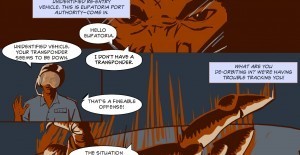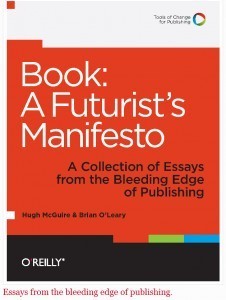Writing on the Ether
Conference Gemütlichkeit
So when the publishing gets weird, the weird go to conferences. Digital conferences. Transmedia conferences. Convene and confer. Confab and rehab.
Early bird discounts are extended to all. Then simply extended. And extended. Do not attempt to adjust the verticals of F W Media, they're bigger than you. A #toccon is a token of meaningful mingling. AWP 2012 started registration eight, count 'em, eight months ahead this year.
In the last 10 days, San Francisco was host to several conferences of note: the second annual Books in Browsers from TOC-heavy O'Reilly Media and the Internet Archive; the debut transmedia-trek StoryWorld from F W; and the latest in Publishers Launch's eBooks for Everyone Else series.
#bbpBox_131826441804460032 a { text-decoration:none; color:#0084B4; }#bbpBox_131826441804460032 a:hover { text-decoration:underline; }.@about 16 hours ago via TweetDeck Reply Retweet Favorite Simon Staffans
Maybe this is why Publishers Lunch has a section called "People, Etc." I think I sat pretty close to Etc. at StoryWorld.
And I was welcomed into a Parc 55 Wyndham elevator by an Oktoberfestive Lufthansa crew. They'd all brought Lederhosen for Halloween.
We're going as Bavarians!
We wiedersehen-ed each other before I thought to ask whether I existed in their storyworld or they in mine. And after a couple of days' expert debate on the "rabbit hole" of story immersion, I've concluded that rabbits and Bavarians are unusually avid participants in narrative.
#bbpBox_131576151096295424 a { text-decoration:none; color:#2FC2EF; }#bbpBox_131576151096295424 a:hover { text-decoration:underline; }"Darlin', tonight *you're* the rabbit hole." #TransmediaPickupLines #swc11[image error]November 1, 2011 11:39 pm via Twitter for iPhone Reply Retweet Favorite J.C. Hutchins
With conference season flaring to life, I propose a Publishing Conferees' Pile of Wishes for organizers. In the interactive spirit of transmedia, I invite you to join me. For starters:
We need tables. Rows of hotel ballroom chairs are for wedding receptions.
Tablecloths? Tell the hotel no. Or serve us dinner.
We need electrical power sources on all those tables. Don't leave us to our own devices without a way to power them.
I stress power sources on tables. Who wants Etc. crawling around underneath to plug in?
We need enough bandwidth to flame a battleship. Lay it on. You want us tweeting your confab, right?
And we need name tags that don't flip around backward. So we don't hoist ourselves on our own halyards trying to ID our colleagues.
An attendee roster and message system (with opt-out, of course). So we know who's there and can reach them.
And now, add your own requests. Jane's comments area is a storyworld unto itself. Join me in letting our publishing conferences' fine organizers know what you'd like to see at these events.
And we'll start with Books in Browsers, then look at StoryWorld.
#bbpBox_130064271160778753 a { text-decoration:none; color:#B40B43; }#bbpBox_130064271160778753 a:hover { text-decoration:underline; }"don't panic - avoid temptation to jump on every new shiny" - words of wisdom from @October 28, 2011 7:31 pm via TweetDeck Reply Retweet Favorite Kat Meyer
Books in Browsers: buddy system
Maybe it was the great weather, the tasty catering (with options for vegans, of course) or the mere fact that we were in San Francisco, but I found myself longing for a good fiery fight at the Books in Browsers conference last Thursday and Friday. The second-annual event hosted by the Internet Archive and O'Reilly Media featuring a roster of blue sky thinkers, practitioners and visionaries — was surprisingly conciliatory. Happy even. What gives? Isn't publishing in crisis?
Edward Nawotka's look-back is as personable and convivial as the conference, itself. O'Reilly's estimable Kat Meyer and the Archive's Peter Brantley provided a robust live stream of both days. Granted, things got mildly Kumbaya at #bib11. And, yes, the emphasis at times seemed to be "on everything but narrative and storytelling," as Nawotka notes. "Amazon, is being looked on with increasing suspicion … referred to euphemistically as "Our Friends in Seattle".
I recommend Guy LeCharles Gonzalez's gracious Richard Nash on Cursor and the "F" Word on Richard Nash's gutsy presentation at bib11 about his failed Red Lemona.de project. There at Books in Browsers was Nash:
Finally acknowledging his boast of launching 50,000 independent publishers was a bit too, let's charitably call it … ambitious.
And in O'Reilly's archive of the conference videos, you can see Nash's presentation: "Yeah, I know; I f–ked up."
I also like Brantley's enthusiasm in a Publishers Weekly blog post, Libraries: Together or Apart
This is an astounding project–originally designed to work with One Laptop Per Child networks, but made more generic–enabling the placement of digital libraries in the most remote corners of the globe.
Nate Holffelder writes up one of the most succinct presentations of the #bib11 conference in This Could Be (Is) The Future of Digital Comics on a project by Pablo Defendini with Tobias S. Buckell

Image from Pablo Defendini's demo for Books in Browsers: Responsive Comic
The reason I like this concept is that he's doing things I haven't seen before in digital comics. The only digital comics I've seen all involved a static page image. Even the ones with directed reading (like comiXology) are based around static page images. Pablo's demo is not.
Here's Defendini's slide set and video of him showing his responsive comic. At around 6:15, watch him shoot his iPhone in action with his iPad's camera for his demo. Surprised chuckles well-earned.
Charlotte Abbott has this write-up on Books in Browsers for Publishers Weekly: Digital Transition Questions Examined at Books in Browsers Conference. David Streitfeld led his piece for the Times, Books Unbound, by sending everyone back to the bar: "Is any form of traditional media under more assault than the book?"
Others I recommend from the conference are the busy Kevin Franco's talk on Personalization in Transmedia Storytelling and Hugh McGuire on The Beauty of Web-first Work Flows.
#bbpBox_129957995588231170 a { text-decoration:none; color:#1F98C7; }#bbpBox_129957995588231170 a:hover { text-decoration:underline; }"p-books"...NOOOOOOO...please start calling them "bound books" it's not much longer falls much more gently on the ear. #bib11[image error]October 28, 2011 12:29 pm via TweetChat Reply Retweet Favorite PubPerspectives
Head spinning yet?
As I fill up your weekend with things to watch and read, I want to suggest you look with special attention at Brian O'Leary's presentation in San Francisco on The Opportunity in Abundance, video or text. O'Leary is our main man in publishing foresight, admired for his unusual ability to gather issues of content and distribution.
Specifically, before we turn to the StoryWorld conference, ponder a set of four defining needs that O'Leary sets up early in his Books in Browsers talk. This is stabilizing as a starting point and seminal for its potential impetus throughout publishing. Here's O'Leary, and the emphasis is mine:
• We need goals, a redefinition of what publishing is and why it matter. That is, we need to reposition publishing as the engine of the engagement economy;
• We need rules, a set of principles that are based in fairness and recognize that we have to balance current requirements with some, perhaps many, future unknowns;
• We need feedback, a shared way to model new approaches, test assumptions and make decisions based in fact; and
• We need a hook, a reason to collaborate
And even more, of great help, from O'Leary and his colleague Hugh McGuire as they roll out their new Pressbooks initiative for multiplatform publication. O'Leary announced at Books in Browsers that Book: A Futurist's Manifesto is readable at no charge. You'll find it moves you forward in your thinking:
The way we think about book, magazine, and newspaper publishing is unduly governed by the physical containers we have used for centuries to transmit information.
#bbpBox_130064372017012736 a { text-decoration:none; color:#009999; }#bbpBox_130064372017012736 a:hover { text-decoration:underline; }"Don't just do it—do it right." @October 28, 2011 7:32 pm via Twitter for iPhone Reply Retweet Favorite Pablo Defendini
StoryWorld: cartographers needed
What I see missing from many of these conversations and theories about multi-platform storytelling is how stories themselves actually build and flourish. Transmedia itself … is often thought of as a series of actions that happen between or across media or the transfer of messages—this isn't "wrong" per se, but it tends to neglect the nuances of human behavior, the levers for why people share stories to begin with and how they connect to each other through different narrative forms.
Gunther Sonnenfeld spoke on a StoryWorld panel called "Measuring Multiplatform IP." (IP, as in intellectual property.) His article, Superstar Beyoncé explained through a narrative ecosystem, might have made a great pre-conference primer for many attendees of #swc11.
The story remains crucial to transmedia. A transmedia project should not originate from the desire to make use of new technology, but from the desire to tell a captivating story.
That's Christine Weitbrecht, who has put together useful recaps of StoryWorld conference sessions here and here.
Weitbrecht's overview capture a sense that the conference was an arrival of sorts for workers in transmedia, and well-earned. Yes, the #bestever! reactions to just about anything that moved were over the top. But no more so than the each session became at times, they were no more over the top than were many of the squeals of delight coming from Books in Browsers. It was also easy to see how much closer to the West Coast and to Canadian production hubs than to New York are some of the understandings here. Nothing wrong with that. I just noted about one wide Biergarten's width between these camps' style and tack and who-you-know.
Legal issues in multiplatform work, potentially spawning any number of revenue streams (may we all be so lucky) can be fiendish. And Simon Pulman, one of my favorite commentators on transmedial issues in New York, wrote well to the point following StoryWorld's legal panel, in Storyworld: Practical Legal Considerations
I began to notice audience members becoming disillusioned and discouraged, particularly when considering the expensive hourly cost of a seasoned attorney. I think it's a dangerous situation to allow fear to chill potential creativity.
And as we all cheered Alison Norrington, whose efforts in pulling off this first StoryWorld were a major niche-triumph, I couldn't help but notice how many StoryWorld speakers made wistful references to maps, especially Tolkien's. There's a longing here for guidance. At least for wider understanding, which StoryWorld can certainly help address over time. As author Bob Mayer wrote, before speaking at the Publishers Launch conference:
Jeff Gomez said that a big problem he sees, particularly in publishing, is that the author isn't involved in the development of the other media. I totally agree with that. A book comes from a single idea the author has. It gets translated into story. The problem is someone taking the story into another medium, might not actually know the original idea. Thus the classic: the book was better than the movie; or the video game.
More commentary, recaps and reviews of StoryWorld are being gathered here by Terre Britten. And Portland-based developer and writer Jason LaPier has been kind enough to pull together my own tweet-storm from the conference, organized by session.
Who would I like to have seen on a panel? James Bridle of London. His presentation back at Books in Browsers, like his article, The New Value of Text, echoes the relentless efforts Norrington makes to root the StoryWorld community in story first, world second. I'll let Bridle play us out of confab city:
Text lasts. It's not platform-dependant, you don't just get it from one source, read it in one place, understand it in one way. It is not dependent on technology: it is what we make technology out of. Code is text, it is the fundamental nature of technology. We've been trying for decades, since the advent of hypertext fiction, of media-rich CD-ROMs, to enhance the experience of literature with multimedia. And it has failed, every time. Yet we are terrified that in the digital age, people are constantly distracted. That they're shallower, lazier, more dazzled.
#bbpBox_129951645789466624 a { text-decoration:none; color:#666666; }#bbpBox_129951645789466624 a:hover { text-decoration:underline; }The "networked #book" posited by @October 28, 2011 12:04 pm via HootSuite Reply Retweet Favorite Porter Anderson
#bbpBox_129950807759138816 a { text-decoration:none; color:#0084B4; }#bbpBox_129950807759138816 a:hover { text-decoration:underline; }I really do feel that books have always been networked, if less visibly, and it is really *us* that are becoming networked now. #bib11[image error]October 28, 2011 12:01 pm via Twitter for Mac Reply Retweet Favorite James Bridle
Your Guardian bot
The Guardian is experimenting with a new Twitter-based service, and would like your help to test it out. @GuardianTagBot is a Twitter account set up for our content API robot, TagBot. If you tweet it with a search term on your phone or online, it will then send you a link to our latest coverage that best matches what you were looking for. It's rather like playing fetch with our articles, videos, galleries and audio.
Potentially an aid in research for writers, the paper in London is Introducing @GuardianTagBot, your new Twitter-based search assistant
#bbpBox_131353969959243776 a { text-decoration:none; color:#FF3300; }#bbpBox_131353969959243776 a:hover { text-decoration:underline; }Fav quote from #swc11 cocktails last night: ebooks are for Tang drinkers, storyboard apps come from concentrate, transmedia is pure pulp[image error]November 1, 2011 8:56 am via TweetDeck Reply Retweet Favorite Bob Carlton
What's the Ether without the aroma of Amazon?
When paidContent's Laura Hazard Owen looked at what track record is discernible, she came up with The Truth About Amazon Publishing:
It will be interesting to see if (Larry) Kirshbaum can use his connections to woo a major fiction author from a traditional publishing house—someone like David Baldacci or Nicholas Sparks. Beyond that challenge, Amazon will have to increase its outreach to bookstores and also solve its Barnes & Noble problem. Sure, it's the digital age. But Amazon Publishing hasn't killed print yet.
Porter Anderson is a Fellow with the National Critics Institute, and a senior producer and consultant formerly with the United Nations World Food Programme in Rome and INDEX: Design to Improve Life in Copenhagen. As a journalist, he has worked with media including CNN, the Village Voice, and the Dallas Times Herald. He's based in Tampa.
Main photo: iStockphoto / sebastian-julian
Jane Friedman
- Jane Friedman's profile
- 1882 followers






